In ensuring a successful job search, you need to put in time and effort. Part of the preparation process is to be armed with job-winning job application tools. One of these is your curriculum vitae. So, what is a CV?
Used to showcase your background and qualifications, your CV can help you present yourself as the best candidate for your target job. With this, you have to make sure you have enough knowledge and skills to write one. Ready to learn more about CV? This guide will go through the sections you must include in your CV, top CV writing tips, and effective CV examples you can use as your guide as you write your own!

What is a CV?
The term CV is a widely used job search jargon that came from the Latin words curriculum vitae, which mean “courses of life.” As it were a ‘course of life’, CV is a comprehensive job search tool that usually runs two or more pages long, depending on one’s career journey.
CV includes all the professional experiences of a job seeker, such as academic background, skills, work history, organizations, and hobbies. Aside from that, it may also mention notable awards, honors, and publications throughout one’s career. In short, a CV is a job seeker’s career biography.
Difference Between a CV and a Resume
Job hunters, employers, and students might already have encountered the two commonly used job search tools: CV and resume. Both these share a common goal: to present you to the employer in the best light possible. Also, these are both popular job application tools. That’s why many job seekers often perceive that they can be used interchangeably.
However, even though these documents are similar, they have their own distinct features that set them apart from each other. Let’s look at them.

Resume
A resume is a job search tool that outlines one’s career journey. It includes academic background, work history, skills, and other job-winning feats relevant to the specific job post. Unlike CVs, resumes must be kept short and concise. Career experts from Resume Professional Writers advise to limit it at optimal length, which means only one to two pages long.
Related Post: Your Guide in Using CV and Resume for a Successful Job Hunt
A resume outlines your expertise and experiences linked to the career or position you want. That said; it can simply set you apart from other job hopefuls. It just takes good writing knack to create a piece that neatly stresses your credentials, relevant skills, and feats.
Know the basics of resume writing—from choice of format to keyword inclusion—to impress your future employer. To start off, choose the right resume format by taking your personal circumstance into consideration. Also, remember your resume should be tailor-made for the post you intend to fill in.
At most, resumes don’t exceed one page and include key details below:
- Name and Contact Information. The header section must contain your complete name, phone number, email address, and present home address.
- Profile Summary. Give the reader a glimpse of your qualifications in 4 or 5 sentences, using strong adjectives that truly describe you both as a worker and as a person.
- Areas of Expertise. List down all your industry-focused strengths and skills for resume and strengths to convey how you will be able to perform the job toward reaching the firm’s goals.
- Work Experience. This section includes the names and locations of the firms you have worked for, inclusive years of employment, your job titles and job descriptions, and key achievements for each job held.
Note that if you’re new to the employment world and you’re afraid because you don’t have enough experience yet, you may include your notable internships or volunteer work that are relevant to the position you’re applying for!
Related Post: What is Internship: Things to Know Before Starting Your Career Journey
Other “minor” sections are education, awards and honors, training, certifications, affiliations, and technical skills. You may check out this blog on the list of free online certifications you can take to add to your impressive list!
Tip: If you want to pursue a creative job, create a visual or infographic resume.
Curriculum Vitae
As mentioned before to the question, “What is a CV,” CV is a highly detailed account of your life’s pursuits, most of which being relevant to the professional and academic realms. Thus, a CV plays a vital role when you apply for a job in academia, science, or research.
The usual CV length of someone who’s just starting their graduate school career may be two or three pages. In contrast, the number of pages of an expert researcher’s CV may reach 4 pages or more.

What to Include in a CV
Aside from knowing the answer to “What is a CV,” you also have to be familiar with what it must contain:
- Name and Contact Details. These include your complete name, phone number, email address, and present home address, along with the contact details of your current school or work.
- Academic History. Unlike in a resume where you only put the college and post-graduate degrees or the highest degree earned, a CV lists all your schooling from high school. Specifically, it cites the degrees you’ve earned and those you’re currently taking up, the schools you went to, year of completion, and titles of your theses or dissertations.
- Work Experience. Create a list of your teaching knowledge, field exposure, laboratory practices, volunteer works, and other related job experience.
- Skills. Put here both the hard and soft skills you have gained over the years.
- Honors and Awards. In citing the honors and awards you have received, put the name of the award and the organization, year received, and brief description about such award.
- Grants. Through this section, tell the hiring manager about the grant or scholarship, date received, and the grant-giving body.
- Publications and Presentations. This section provides lists of presentations you gave in conferences and your published books and articles.
- Memberships. This is a list of professional groups you have joined. Put here the organizations’ name, location or chapter, and the dates of your membership.
When to Use a CV
To emphasize, you’ll need to write and submit a CV if you’re in these fields:
- Academia
- Medicine
- Law
- Research outside the academia
Want to know more about the difference between the two? Here are the factors that will help you determine which one’s the best for your job hunt.
Length
A CV, being a career biography, is lengthier than a resume. It has no page limit and can stretch up to three pages or even more. Despite the liberty to use more pages, you must still keep your document comprehensive yet concise. On the other hand, resume writing follows stricter guidelines. Usually, a resume doesn’t exceed two pages. For fresh graduates, it’s best to summarize your accomplishments into a single-page document to optimize it for your job search.
Purpose
Resume is commonly used for job search. It’s one of the basic requirements that hiring managers look for in a job application for any job post, along with other documents. Meanwhile, aside from job search, a CV can also be used for academic purposes or scientific job posts.
Format
CV doesn’t change as often as resume. It is because a CV narrates one’s career journey and only needs constant updating. On the other hand, resumes are more specific and highlight achievements for a single position. Because of this, job seekers can often use a single CV for several job posts, whereas they must tailor their resume for every specific job position.
Now that you know the many differences and similarities between CV and resume, try making one yourself. Read on for some helpful tips to produce a job-winning piece.

How to Write a CV
With today’s struggle for employment, your CV has just one chance to make a great impression. For hiring managers to consider you for an interview, your CV must have that special impact that grabs their attention and compels them to give you a call.
So, how do you impress them through your application tool? It’s not enough that you only have the basic knowledge about “What is a CV?” Here are five curriculum vitae writing tips that work:
1. Create an engaging summary.
Your career profile or summary is the most important part of your CV. Employers will read the first part of your content, so make it appealing, concise, and direct to the point. An ideal profile sums up your accomplishments, credentials, and skills without using killer buzzwords and clichés.
2. Choose the right font style and size.
Too large texts on your CV show you have little to say about yourself while so small fonts will make it crowded and difficult to read. The perfect font size for the body text is 10 or 11 and 14 for subheadings. For the main page header, use sizes 20 to 22 to make an “impact” and grab the hiring manager’s attention. For font style, avoid outdated serif fonts such as Garamond and Times New Roman. Instead, go for sans serif fonts that include Verdana or Tahoma to make it look modern and fresh.
3. Use visual aids.
Use bullet points, bold formatting, line breaks, and columns on your CV to add more impact on how it looks.
4. Be consistent with your font and style settings.
Whatever style and font you use, be sure to keep them the same throughout your CV. You don’t want your CV format to appear chaotic because of different fonts and indentations.
5. Mind the length of your CV.
Your CV serves as a selling tool, not a biography. Try to keep it focused on your key selling points. Use a one-page CV if your experience is less than 10 years or 2 pages if you’re armed with more than 10 years of experience. Consider a three-page CV if you’re a senior-level executive with a long record of accomplishments.
Difference Between US and International CVs
In the US, sending a resume for every job application is a common practice, unless applying for a position in the academe, research, or overseas. In these cases, Americans present a CV. Moreover, most employers in other countries such as the United Kingdom and those in the Middle East prefer CVs. It’s also important to note that international CVs are written and formatted more like a resume than they are an academic CV for the US market.
Effective CV Examples
Need more guides to help you craft your own job-winning CV? Check out these CV examples!
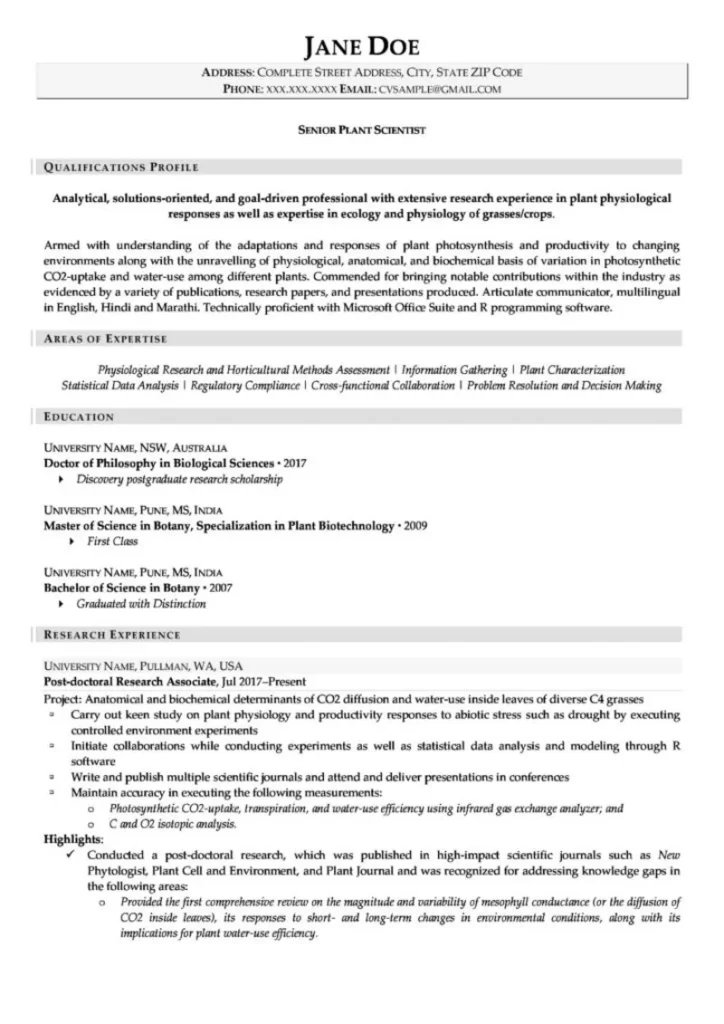
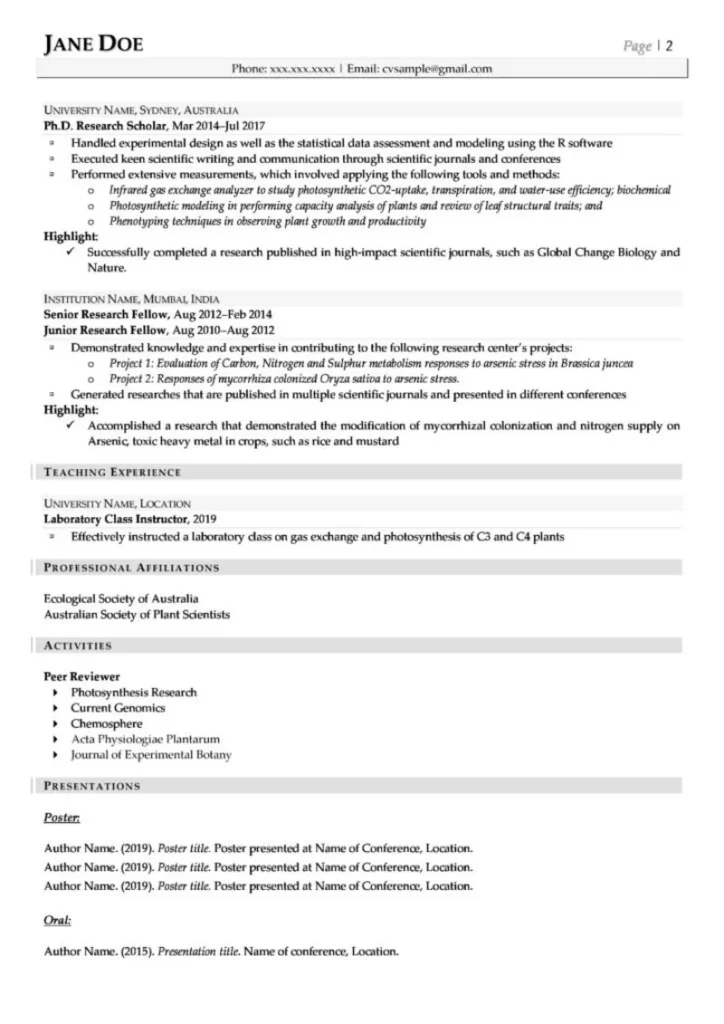
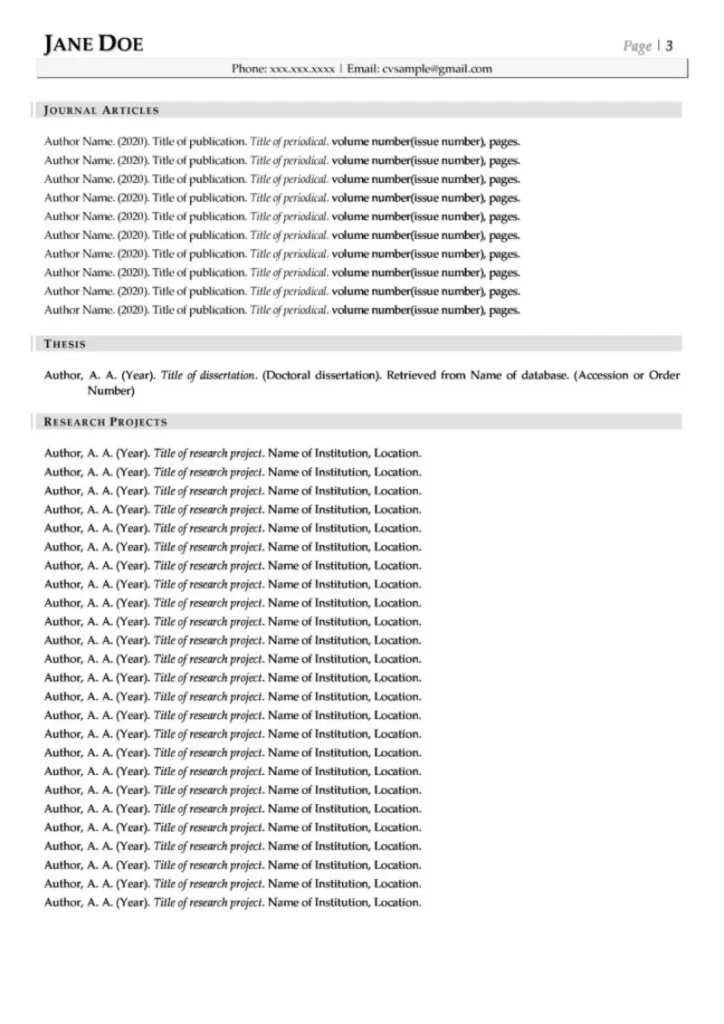
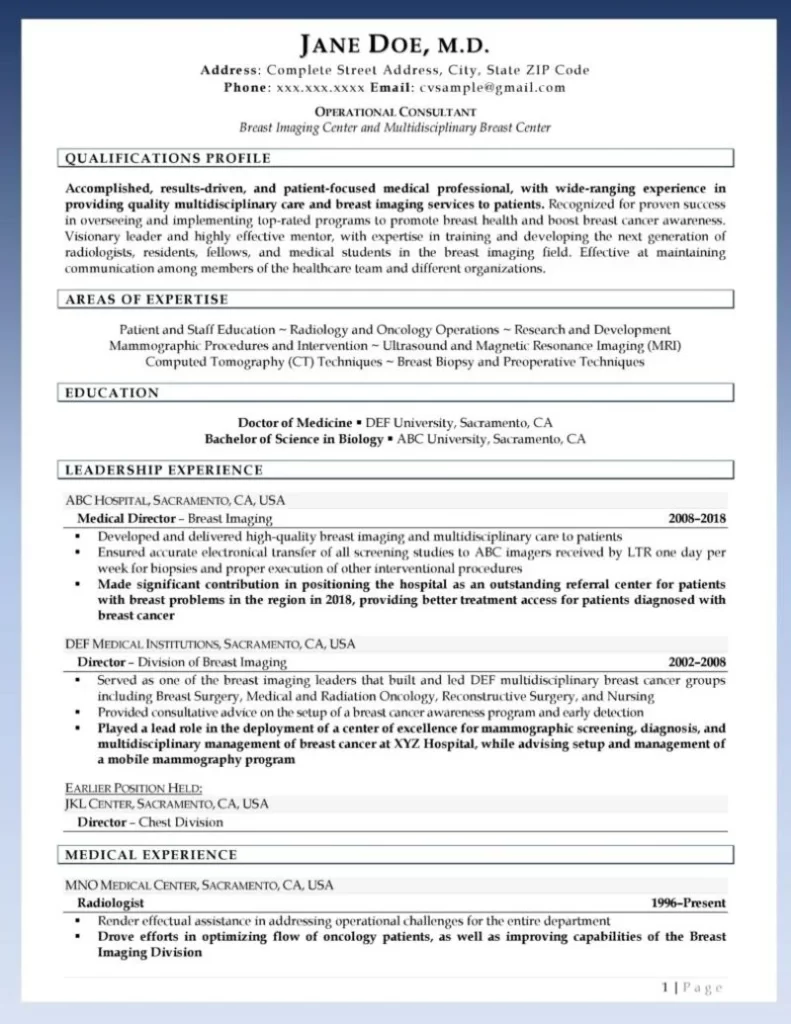
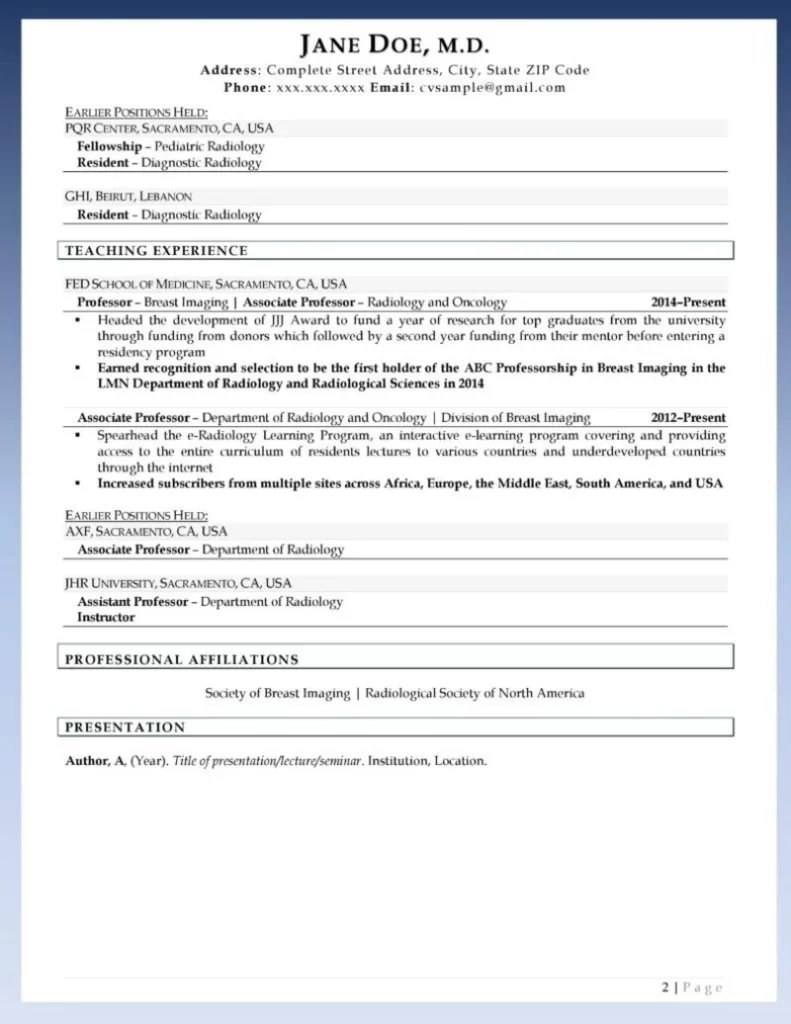
CV example: field-specific CV #2
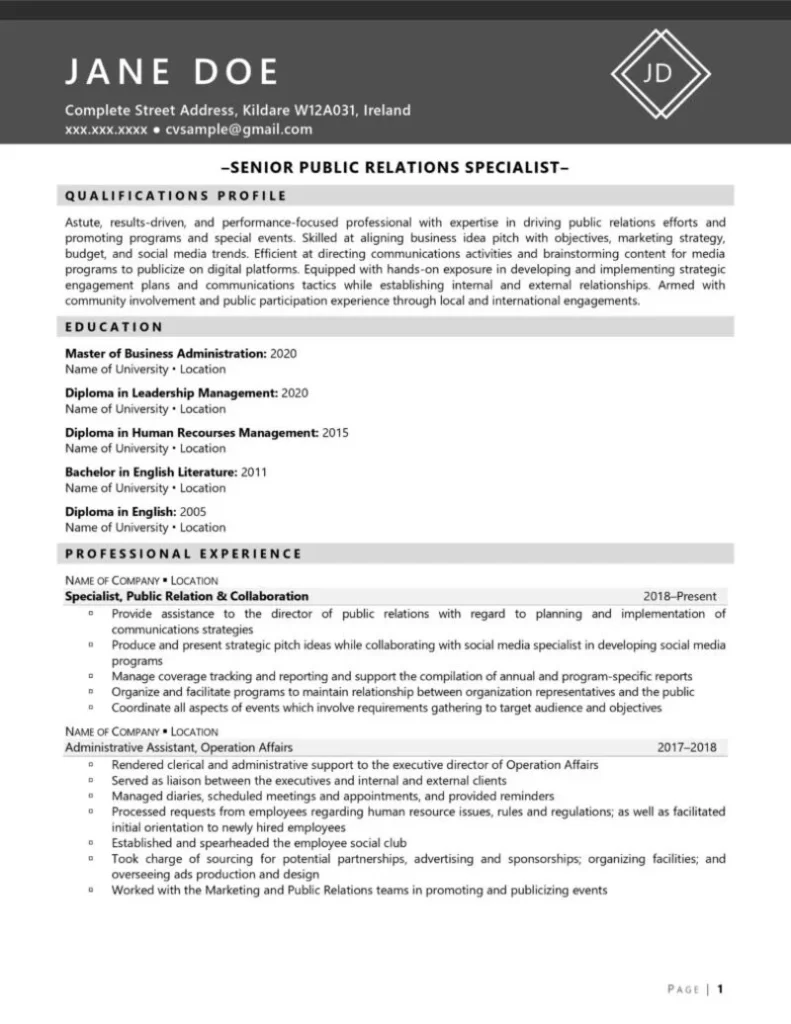
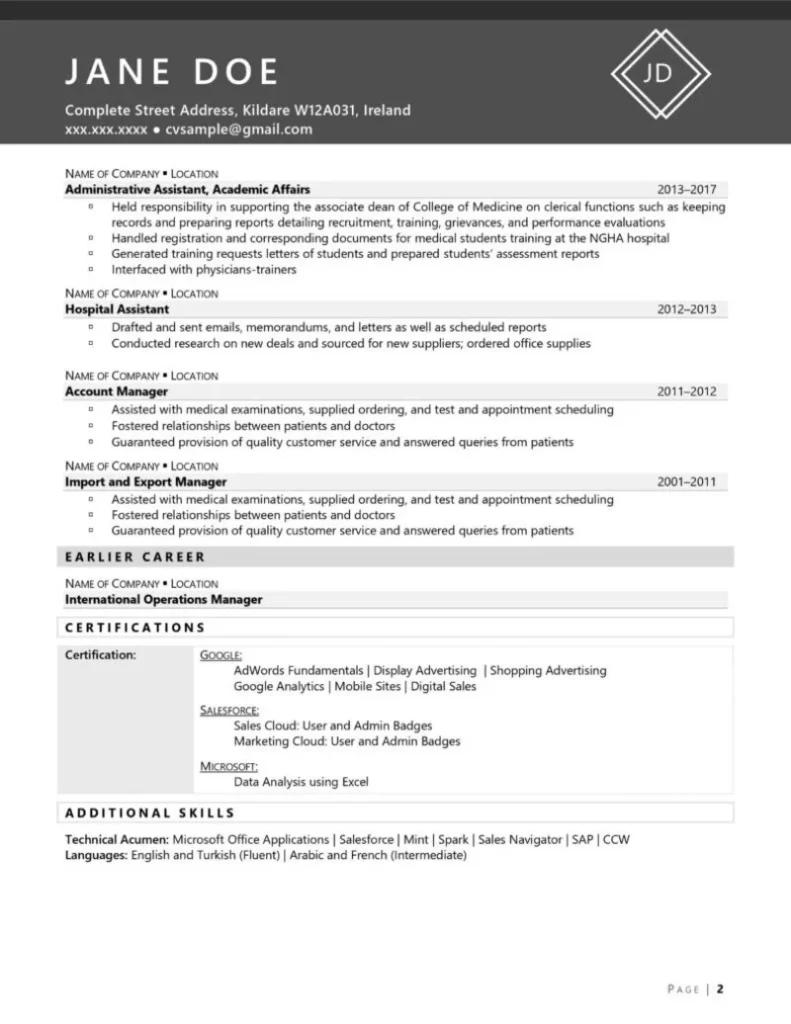
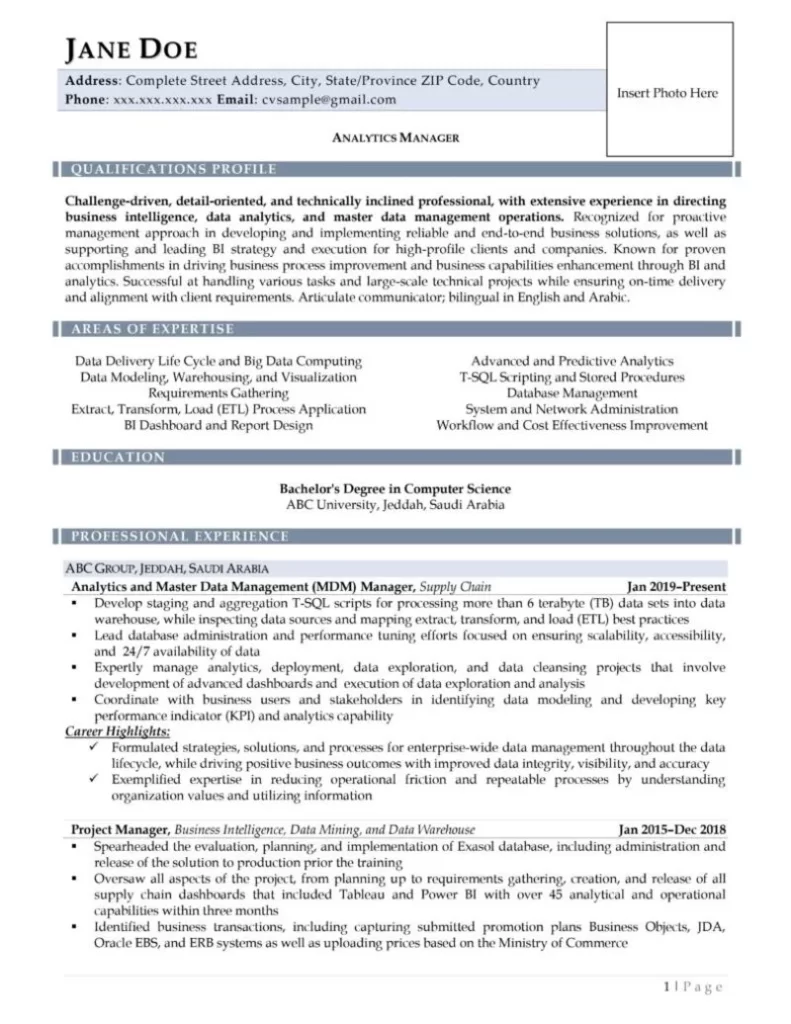
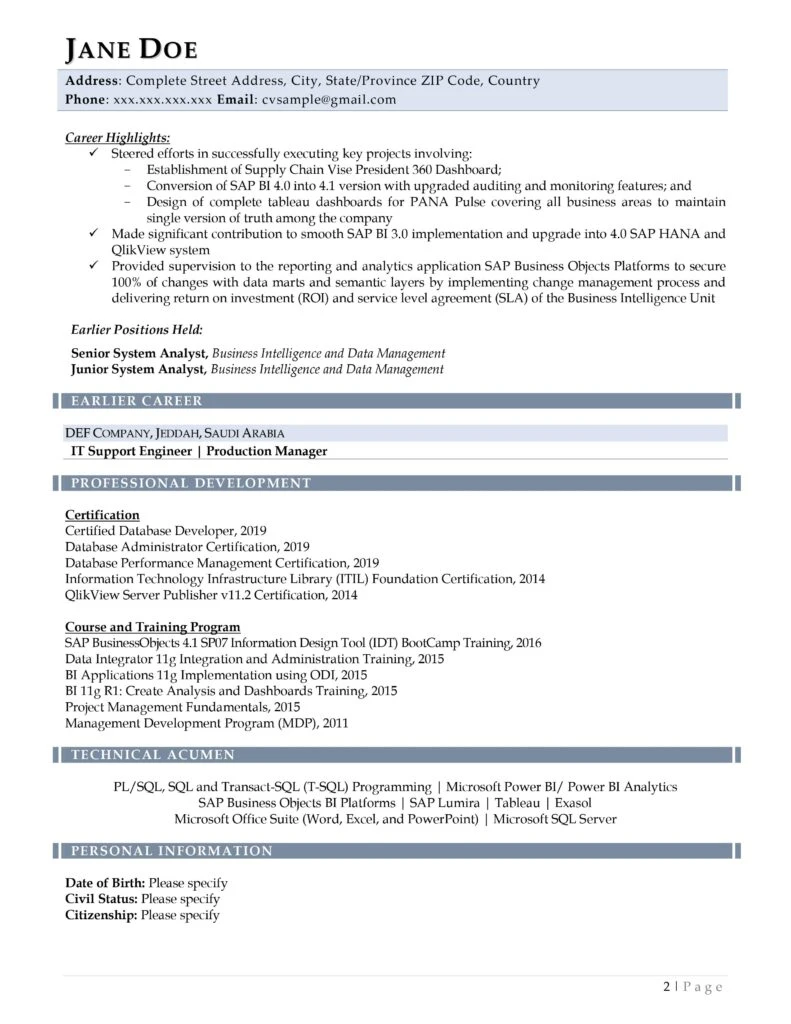
Start Your Worthwhile Job Search Today!
Since most of us are staying indoors because of health and safety reasons, we have enough time to set our SMART goals for our career and review our job search tools. Plan and align your visions to your career choices. Level up your job search with an improved CV! You may check out our CV writing services today to see the best package for your job search needs. Contact us for more details.








